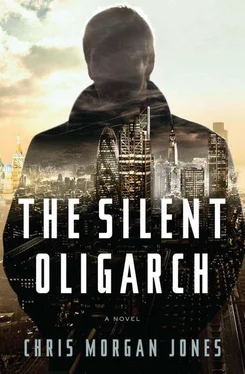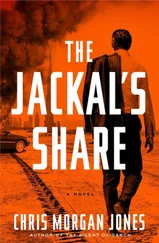He swallowed, consciously, smiled at Marina and looked away. Down below the dance came to an end, Vika sliding to a stop on her knees with her arms and head thrown back. He clapped, and the handful of parents in the gallery followed. Vika got to her feet and smiled up at him.
“Are you OK?” Marina said.
He turned to her and smiled again, not wholly convincing himself. “It’s just lovely to see her.”
“We’re very lucky.”
“We are.”
Lock paused. He was faintly aware of needing to air a question he couldn’t frame. “Is she happy? Here in London.”
“I think so. She loves London.” Marina looked at him closely, a slight frown across her brow. “Is that what you mean?”
“I don’t know.” He looked down. The teacher was telling the children to form a circle. “I worry about what I’ve done to her.”
“She doesn’t see it as your fault.”
“That doesn’t mean it isn’t. She’ll know one day.”
Marina crossed her arms and watched the dancers. “Is this leading somewhere?”
“I… I suppose I’d like to say I’m sorry.”
“She wouldn’t understand.”
“I don’t mean actually say it.”
“What, then?” Marina glanced at him and then turned back to the lesson.
Lock thought. He couldn’t find the words, because he didn’t yet know what he wanted to say. Marina always knew what was in her heart, and the more complicated the situation—where he would grope around among desires and fears that sat forever in shadow, reticent, unassuming—the more clearly she knew it. This was what he remembered of their arguments. What he had since come to realize was that there can have been no sense of triumph for Marina in these easy victories, that they must have been at best an additional disappointment, and he was conscious now, at least, of wanting to show her that he had changed.
So: what did he want? Some knowledge must have been distilled from the slow, dripping process of the last four years. In his mind a pair of images sat juxtaposed: his flat in Moscow, hard and bright, its marble floors polished to a shine, the leather furniture unworn, the kitchen redundant, the whole thing empty now and always empty; and his daughter in her T-shirt dancing and spinning below him.
He wanted to be away from money. That he did know. In his world every act was a transaction, every relationship a wary contract. He had always thought himself a shrewd if minor player of the game, but since Monaco he had become aware for the first time of the price of competing, of the steep and perhaps unavoidable cost.
He looked at Marina. How often had he sat like this, watching her in profile and failing to find the words that would turn her to him? He felt a flush of guilt and then of failure at the thought.
“I’d… I’d like to see more of you,” he said. “Of both of you.”
“You’ve said that before.”
“I haven’t. I’ve said I’d visit more often. This is different.” Marina closed her eyes and pinched the bridge of her nose. He went on. “I want to see more of you. Not just visit but spend time together. Do things.” Marina didn’t reply. “Normal things.”
She turned to look at him and he felt the coolness that was sometimes in her eyes.
“You have work to do, Richard. You know that.” She paused. “Leave Moscow. Find a way. I don’t want that in our family anymore.”
Lock nodded gently, his eyes down. “And if I do?”
Her eyes softened. At times like this they seemed to suggest that there were greater sorrows than her own. “The worst part of this was seeing you lost. I still hate it.”
He nodded again. Below him the dance teacher was counting out a four-four rhythm and Vika, watching her intently, was trying to follow a new move. Lost. It was a good word for him. He had drifted way off course; perhaps too far.
SOMETIMES WHEN A JOB BEGAN you surveyed the ground, found it undisturbed, and simply had to start digging to see what was there; sometimes you arrived to find it churned up by others before you, and set to it with enthusiasm in the loose earth they had left behind. But this was new to Webster. He could guess what was buried and where, almost see it, but he couldn’t get near enough to dig.
Now he sat with his hands clasped behind his head, slouching almost off his chair, looking at the wall and wondering what he would do when he ran out of space. He had his own chart. It was made up of eight sheets of flip-chart paper and took up one wall of his office. On it he was writing in soft dark pencil everything of note about Project Snowdrop (Ikertu, ever hungry for project names, was working its way through flowers). He had a box for Malin at the top left; at the bottom left, one for Faringdon; top right, Lock; bottom right, Grachev. In each, in slanting capitals, were growing lists of ideas, attributes, facts. In the middle of the chart and expanding outward was what looked like a complex molecule, circles of different sizes connected by arrowed lines, and within the circles names of people, companies, organizations, places: Lock, Malin, Faringdon, Langland, Uralsknefteprom, Rosenergo, the Ministry of Industry and Energy, the Kremlin, Berlin, Cayman, Ireland. At least a dozen circles had been ringed in red: Dominic Swift, Ken McGee, Savas Onder, Mikkel Friis, Marina Lock, Dmitry Gerstman, and others.
His researchers thought his pencil and paper approach primitive and even ridiculous; they had database programs that would map this information in moments and never miss anything. Webster would patiently explain to them that this wall of notes wasn’t a calculation but an inching toward the truth, something requiring experience and intuition, patience and a soft eye. This was at once grander and murkier than an investigation of anything as mundane as a crime: it was a battle, silently fought, where victory would come to the man who could best understand his enemy’s weakness. Laid out here was Malin’s world, and until you really saw it—knew how it looked to him—you couldn’t hope to unpick it.
But after four weeks he had only a faint and frustrated sense of it. He had had four researchers reading every newspaper article they could find in Russian and English. Two had taken Malin and the ministry; one had taken Faringdon, Langland and all the companies connected to them; and one had focused entirely on Lock and Grachev. A further two had been deep in company registries, reconstructing the network that Lock had created and trying to work out from the scant information available what the companies within it actually did.
They had started with Faringdon. The corporate registry in Dublin gave them the names of its directors (Lock and a Swiss national called Ulrich Rast), an address, and its shareholders: nine further offshore companies, each several degrees more obscure than their Irish offspring. There was little else. The address belonged to a company that existed solely to set up and administer other companies and was therefore of no consequence; the company secretary worked for the same firm; Herr Rast too was merely a professional administrator, if of a rather exalted Swiss variety. The only point of interest was the nine shareholders; to have so many was unusual, and the purpose of the structure wasn’t clear. It suggested the work of someone clever or someone cautious. At least Faringdon itself was active; at least it did something. It bought companies, or stakes in them. From scouring the press—in Russia, in Azerbaijan, in Bulgaria, Kazakhstan, Ukraine—Webster’s researchers found eighteen deals that Faringdon had made, and carefully noted the timing and circumstances of each. Then they researched every counter-party, every co-shareholder, and recorded all their findings on an ever-growing plan in the hope of finding patterns, coincidences, meaning of any kind.
Читать дальше












